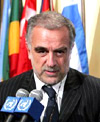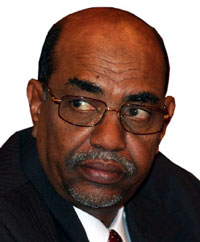International Court prosecutor charges Sudan’s leader with genocide
- Is oil behind indictment of Sudanese president? (FCN, 07-22-2008)
- Sudan and America’s racist foreign policy (FCN, 06-25-2007)

UNITED NATIONS (FinalCall.com) – The prosecutor for the International Criminal Court in The Hague, which is located in Brussels, announced July 14 that he was presenting the case for genocide against Sudanese President Omar Al-Bashir.
ICC prosecutor Luis Moreno-Ocampo, of Argentina, accused President Al-Bashir of committing crimes of genocide, crimes against humanity and war crimes in the Darfur region. The prosecutor has requested an arrest warrant.

The prosecutor alleges President Al-Bashir’s “intent to commit genocide became clear with the well coordinated attacks on the 2.4 million civilians who found a haven in the camps” set up as a result of civil war between rebels and the Bashir government in the region. “Al-Bashir organized the destitution, insecurity and harassment of the survivors. He did not need bullets. He used other weapons: rapes, hunger, and fear. As efficient, but silent,” charged the prosecutor.

Instead of assisting in Darfur, Mr. Bashir mobilized “the entire state apparatus, including the armed forces, the intelligence services, the diplomatic and public information bureaucracies, and the justice system, to subject the 2,450,000 people living in IDP’s camps, most of them members of the target group, to conditions of life calculated to bring about their physical destruction,” according to the ICC charges.
“Al-Bashir is the president. He is the commander in chief. Those are not just formal words. He used the whole state apparatus, he used the army, he enrolled the militia/Janjaweed. They all report to him, they all obey him. His control is absolute,” added Prosecutor Moreno-Ocampo.
“The Pre-Trial Chamber 1 now reviews the evidence. If the judges determine that these are reasonable grounds to believe the named individual committed the alleged crimes, they will decide on the best manner to insure his appearance before the court,” said Mr. Ocampo in a press statement.
This will be the first time a bill of crimes against humanity has been issued against a sitting president. The pre-trial panel is made up of three judges from Brazil, Ghana and Latvia. Previous indictments have been issued against former Serbian leader Slobadan Milosevic and former Liberian President Charles Taylor.
In seeking the warrant, the prosecutor is acting within his mandate under the Rome Statute and from the United Nations Security Council, which in 2005 referred to crimes committed in Darfur for investigation.
According to a statement from the United Nations, Secretary-General Ban Ki-Moon and President Al-Bashir held a phone conversation and the secretary-general stressed the UN does not have any influence over the ICC prosecutor.
Sudan’s ambassador said July 14 that his nation will try to persuade the UN Security Council to block a prosecutor from pursuing genocide charges against the Sudanese president. Dr. Abdamahmood Abdalhaleem Mohamed, in an interview with The Associated Press, said Mr. Al-Bashir is weighing all options, including an undefined military response. Amb. Mohamed also said Mr. Al-Bashir likely will visit the UN General Assembly in September, and that Sudan would consider any attempt to arrest him a declaration of war.
Some observers say the Bush administration once again showed a double standard, having opposed the ICC saying it would conduct biased investigations of alleged crimes by U.S. service members, but voting for the Security Council investigation into the crimes being committed in Darfur.
“I am concerned about that,” said Rev. Herbert Daughtry, a longtime activist and founder of the Brooklyn-based National Religious Leaders of African Ancestry Concerned for Darfur. “Hopefully this will move the U.S. to ratify the convention of the ICC. What’s good for the goose is good for the gander,” he said.
The move by the ICC prosecutor had been anticipated, and according to Agence France Presse, July 13 some 1,000 protestors gathered in the Sudanese capital city of Khartoum chanting, “Down, down with the USA.” AFP also reported that Pres. Al-Bashir presided over a two and a half hour “crisis meeting” with his cabinet.
AFP quoted the Sudanese state media as saying the ministers rejected any move by the ICC to prosecute Sudanese leaders for alleged war crimes in Darfur.
“We will crush this attempt against our country as we have done on previous occasions,” the Sudanese ambassador to the UN told The Final Call July 12 in a corridor outside of the Security Council chamber. “They have tried through sanctions. They have tried through using others to invade our country. We are confident in our leadership; and we are confident in our country,” the ambassador said.
In early June, while attending the Leon Sullivan Summit in Tanzania, Pres. Al-Bashir was quoted as saying the U.S. was trying to “dictate matters” on his nation’s internal affairs. He asked the international community for a chance to broker peace in Darfur and said he was “against” U.S. wars in Iraq, Afghanistan and Somalia and “its interference in Palestinian affairs.”
During a press conference broadcast live via satelite to the 2007 Nation of Islam Savior’s Day convention, Pres. Al-Bashir said, the U.S. was exaggerating troubles in his nation’s Darfur region to control Sudan as it controls Iraq. “A number of governments, including the United States, are putting pressure on Sudan,” he said. “They’re imposing solutions that don’t respect the dignity of our nations,” Pres. Al-Bashir said.
“Prosecutor Moreno-Ocampo’s charges against al-Bashir underscore the need for the UN Security Council to finally act decisively with a comprehensive strategy for Sudan. The world at-large, primarily the Security Council, has allowed Al-Bashir to continue his reign of destruction, recalcitrance and violence with utter impunity. These charges must now sober Al-Bashir’s international apologists who continue to shield and protect the Khartoum regime from meaningful measures with meaningful consequences,” countered Jerry Fowler, president of the Save Darfur Coalition.
The Honorable Minister Louis Farrakhan has warned about the U.S. desire to gain access to vast oil deposits in the Sudan. “Did you know that they found the largest deposit of oil anywhere in the world? Guess where they found it? In the southern Sudan. And what America is trying to do is foster the revolution to break off the southern Sudan from the Islamic regime in Khartoum so that America can have access to the oil. But they say it’s them Moslems killing Christians; making slaves out of these people in the South. America sent arms to Eritrea and Ethiopia and Uganda. So all along the border of Sudan, war was started with the Sudan. But something happened. Eritrea started using her weapons against Ethiopia, and vice versa. So (Eritrea and Ethiopia) couldn’t give the Sudan the trouble that America wanted,” he said, in a message published in the April 1 edition of The Final Call.
If the American people knew more about U.S. foreign policy, it would better reflect the interests of the people, the Minister said.
Abdul Akbar Muhammad, Africa and the World syndicated columnist, told The Final Call during a July 13 telephone interview, people should understand that the U.S. issue with the Khartoum regime is all about oil.
“The U.S. realizes to get the oil they need regime change,” Mr. Muhammad said. The Sudanese president has said he would refuse to allow American firms to drill for oil in the South, preferring companies from China, Malaysia, India, Pakistan, France and Sweden. U.S. firms had been “too demeaning” and their conditions “were unacceptable,” he said.
Mr. Muhammad noted that one of the conditions facing the Sudanese president, if the warrant is formally issued, is the travel ban. “This ban will prevent Pres. Al-Bashir from traveling to talk with leaders, as he has done in the past, traveling to Iran, China, Libya and Venezuela.”
According to the AFP, Sudan’s minister of information alluded to the travel ban, which he said would prevent the president from pressing ahead with foreign diplomacy and other peace efforts.
The struggles in Darfur date back to 2003 when two rebel groups attacked Sudanese government entities, declaring a fight against bias toward the region’s tribes. Khartoum supported a local militia known as the Janjaweed and anti-Sudanese government sources say a “brutal counter-insurgency campaign” has left 200,000 dead and two million more displaced.
The Bush administration has accused the Sudanese government with genocide.
“The UN has refused to call what is happening in Darfur genocide; and until a recognized international body declares it as such, it is not genocide,” said Mr. Muhammad.
On the issue of a reported 200,000 people dead, Mr. Muhammad said, when they were searching for evidence against Mr. Milosevic in Serbia they used planes with sensitive equipment that located the mass graves. “Why aren’t they using these same planes in Darfur?” he asked.
Mr. Muhammad is concerned about reporting by the Western media of Arab versus Black Africans. Both sides are Black, he said.
Rev. Daughtry told The Final Call he is not surprised that the ICC issued a call for an indictment. “I have been to Chad twice, and I heard a lot of testimony from refugees from Darfur and the rebel groups. I think what should happen now is that all of this has to be proven,” he said. “At least now we can see the facts as they really are.”
Related links:
Sudan and America’s racist foreign policy (FCN, 06-25-2007)
Black media delegation returns from Darfur (FCN, 03-15-2007)
Darfur, Uganda and the U.S. campaign to destabilize Sudan (FCN, 01-01-2007)
On the politics of Darfur negotiations (Sudan Tribune, 11-30-2006)
Darfur, Sudan: Seeking the Truth (FCN Webcast, 05-07-2006)
Sudan needs help, not sanctions – A report from Darfur (FCN, 09-23-2004)












